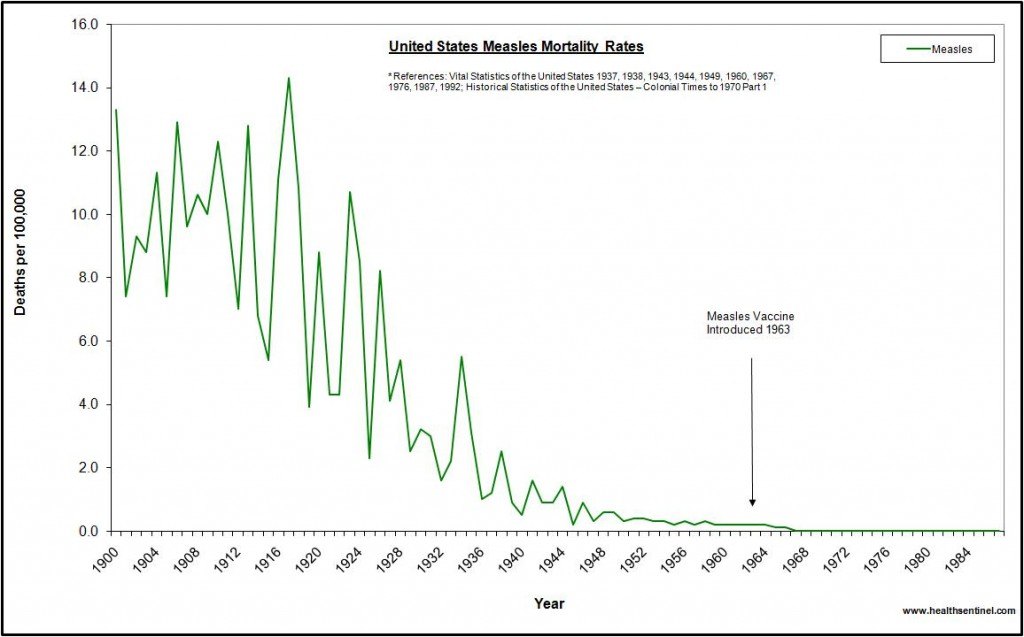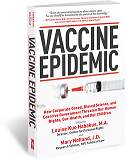
Image from healthsentinel.com
This article is part 2 of the article we previously published Outbreaks of Measles in Vaccinated Children Intensifying.
by Dr. Viera Scheibner (PhD)
International Medical Council on Vaccination
Measles Vaccines Part II; Benefits of Contracting Measles
Well-managed natural infectious diseases are beneficial for children.
When infectious diseases of childhood are not mismanaged by the administration of antibiotics, or by suppressing fever, the diseases prime and mature the immune system and also represent developmental milestones.
Having measles not only results in life-long specific immunity to measles, but also in life-long non-specific immunity to degenerative diseases of bone and cartilage, sebaceous skin diseases, immunoreactive diseases and certain tumours as demonstrated by Ronne (1985).
Having mumps protects against ovarian cancer (West 1969).
This is the area that should be researched and the results heeded instead of trying the impossible: to eradicate infectious diseases.
Approaching childhood diseases with common sense and wisdom.
The already quoted large group of Swiss doctors that formed a working committee questioning the Swiss’ Health Department’s policy of mass vaccination with the MMR (measles, mumps and rubella) vaccine, wrote that up to 1969, at the Basel University Paediatric Clinic, artificial infection with measles was used to treat successfully the nephrotic syndrome (Albonico et al. 1990).
Asthma and allergies prevented by natural measles disease.
As shown by Shaheen et al. (1996), even in a developing country having measles is beneficial: it prevents atopy: “After adjustment for breastfeeding and other variables, measles infection was associated with a large reduction in the risk of skin-prick test positivity to household dustmite . . . 17 (12.8%) of 133 participants who had had measles infection were atopic compared with 33 (25.6%) of 129 of those who had been vaccinated and not had had measles”.
Alm et al. (1999) wrote that increased prevalence of atopic disorders in children may be associated with changes in types of childhood infections, vaccination programmes, and intestinal microflora.
They found that at the Steiner schools in Sweden, “52% of the children had had antibiotics in the past, compared with 90% in the control schools…18% and 93% of children respectively, had had combined immunisation against measles, mumps, and rubella, and 61% of the children at the Steiner schools had had measles”.
“Fermented vegetables, containing live lactobacilli, consumed by 63% of the children at Steiner schools, were compared with 4.5% at the control schools….Skin-prick tests and blood tests showed that the children from Steiner schools had lower prevalence of atopy than controls”.
Engineered measles virus used in anti-cancer therapy.
Carmona Mota (1973) described a remission of infantile Hodgkin’s disease after natural measles. They wrote, “A 23-months-old Caucasian male was seen for the first time in April 1970 with a large mass in the neck due to hypertrophy of the left cervical lymph nodes. Before radiotherapy could be started the child developed measles. Much to our surprise the large cervical mass vanished without further therapy.”
Many others started researching and writing about the oncolytic (cancer-destroying) effect of measles virus.
Msaouel et al. (2009) conducted clinical testing of engineered oncolytic measles virus strains in the treatment of cancer. Even though the virus they used was a vaccine-type virus, the research was done in vitro with a virus directly injected into the tumour. They wrote, “It is of note that a number of viral strains, including certain derivatives of the attenuated live measles virus Edmonston (MV-Edm) vaccine strain, demonstrate a propensity to preferentially infect, propagate in, and destroy cancerous tissue.
The reason for using modified viruses was given as “concerns regarding the potential of wild-type-viruses to cause serious side effects, technical limitations in manufacturing viral lots of high purity for clinical use, as well as the overwhelming excitement and fervent support for the, at the time, newly emerging chemotherapy approaches that slowed down research on alternative strategies”.
One can reasonably speculate that there were also political reasons for using a vaccine measles virus (an engineered measles virus), and not the wild measles virus, because the next question to answer would be why not simply let children have the natural measles and thus achieve the long-term non-specific immunity to a number of cancers.
The dangers of medical interference in disease management.
It is disconcerting that as in the past, even today’s doctors still relentlessly suppress fever and administer antibiotics as part of the standard practice ignoring well-documented published research which demonstrated that suppressing fever at the same time as administering antibiotics (and other medications) encourages the growth and general viability of the pathogens and their ability to develop resistance to such medications and may lead to their increased virulence (Mackowiak (1981)).
I end with an important message from history, which unfortunately fell on deaf ears and which has not lost its relevance to modern medical practice.
In a letter to the Duchess Sophia, mother of the future George I of England, Princess Elizabeth Charlotte (Liselotte) von der Pfalz, Duchess of Orleans and widow of the younger brother of Louis XIV, wrote:
Our misfortune continues. The doctors have made the same mistake treating the little Dauphin as they did ministering to his mother, the Dauphiness. When the child was quite red from the rash and perspired profusely, they [the doctors] performed phlebotomy and administered strong emetics; the child died during these operations. Everybody knows that the doctors caused the death of the Dauphin, since his little brother who had the same sickness, was hidden away from the 9 physicians who were busy with his older brother, by the young maids, who have given him a little wine with biscuits.
Yesterday, when the child had high fever, they wanted also to perform phlebotomy but his two governessess were firmly opposed to the idea and instead kept the child warm. This one also would have certainly died if the doctors had had their way.I do not understand why they don’t learn by experience. Had they no heart, when they saw the Dauphiness die after phlebotomy and emetics, not to dispose of her child?
Koprowski (1962) summarised the still relevant historic message, ”Avoid physicians and thou will be cured.”
Summary
Despite their long history of failures and tragedies arising from their observed derailing effects on the immune system, outdated procedures for both disease prevention, i.e. vaccination, and disease management, i.e. treatment hostile to the body’s defences, such as antibiotics and anti-pyretics, remain standard practice to this day. The damage already done will continue to affect future generations for some time to come.
The unscientific standard procedures should be abandoned and the natural processes and the innate intelligence of the immune system respected. Medicine should adopt a common sense attitude to natural infectious diseases and their vital role in priming and maturing the immune system, for children’s long-term benefit.
Read the full story here: http://www.vaccinationcouncil.org/2013/01/29/measles-vaccines-part-ii-benefits-of-contracting-measles-by-dr-viera-scheibner-phd
References
Ronne T. 1985. Measles virus infection without rash in childhood is related to diseases in adult life. Lancet; 5 Jan: 1-5.
West RO. 1966. Epidemiologic studies of malignancies of the ovaries. Cancer; 1001-1007.
Albonico H et al 1990. Vaccination campaign against measles, mumps and rubella, A constraining project for a dubious future? Working group of doctors for selective MMR vaccination.18 pages, self-published.
Sheheen et al. 1996. Measles and atopy in Guinea-Bissau. Lancet; 347: 1792-1796.
Alm et al. (1999). Atopy in children of families with an anthroposophic lifestyle. Lancet; 353: 1485-1488.
Carmon Mota H. 1973. Infantile Hodgkins’disease: remission after measles. BMJ; 19May: 423.
Msaouel P, et al. 2009. Clinical testing of engineered oncolytic measles virus strains in the treatment of cancer: An overview. Curr Opin Mol Ther; February; 11(1): 43-53.
Mackowiak PA. 1981. Direct effects of hyperthermia on pathogenic microorganisms: teleologic implications with regard to fever. Rev Infect Dis; 3(3).
Koprowski H. 1962. The role of hyperergy in measles encephalitis. Am J Dis Child; 103:103-108.
About the author
 Dr Viera Scheibner is Principal Research Scientist (Retired) with a doctorate in Natural Sciences from Comenius University in Bratislava. After an eminent scientific career in micropalaeontology during which she published 3 books and some 90 scientific papers in refereed scientific journals in Australia and overseas, she studied babies’ breathing patterns with the Cotwatch breathing monitor developed by her late husband Leif Karlsson in the mid 1980s. Babies had alarms after vaccination, indicating stress. This introduced her to the subject of vaccination. She then started systematically studying orthodox medical papers dealing with vaccination issues. To this day she has collected and studied more than 100000 pages of medical papers.
Dr Viera Scheibner is Principal Research Scientist (Retired) with a doctorate in Natural Sciences from Comenius University in Bratislava. After an eminent scientific career in micropalaeontology during which she published 3 books and some 90 scientific papers in refereed scientific journals in Australia and overseas, she studied babies’ breathing patterns with the Cotwatch breathing monitor developed by her late husband Leif Karlsson in the mid 1980s. Babies had alarms after vaccination, indicating stress. This introduced her to the subject of vaccination. She then started systematically studying orthodox medical papers dealing with vaccination issues. To this day she has collected and studied more than 100000 pages of medical papers.
Despite such extensive research of orthodox medical papers published on vaccines over the past 100 years, she established that there is no scientific evidence that these injections of highly noxious substances prevent diseases, quite to the contrary, that they increase susceptibility to the diseases which the vaccines are supposed to prevent and also to a host of related and unrelated viral and bacterial infections. Vaccines are involved in a great number of modern ills of childhood such as immunoreactive diseases (asthma, allergies), autoimmune diseases (diabetes, multiple sclerosis, lupus erythematosis), cancers, leukaemia, degenerative diseases of bone and cartilage, behavioural and learning problems, to mention just the most important conditions.
Her research into vaccination has culminated so far in two books and a number of shorter and longer individual papers published in a variety of scientific and medical publications. She has also conducted frequent international lecture tours to present the results of her research to parents, health and medical professionals and anyone else who is interested. She has also provided a great number of expert witness reports for court cases relating to deaths and injuries caused by vaccines, such as so-called “shaken baby” syndrome.
Vaccine Epidemic
by Louise Kuo Habakus and Mary Holland J.D.
FREE Shipping Available!




